Tài liệu [Luyện thi tiếng Anh] Unit 1&2: Tenses docx
Bạn đang xem bản rút gọn của tài liệu. Xem và tải ngay bản đầy đủ của tài liệu tại đây (122.77 KB, 8 trang )
THE PRESENT SIMPLE, THE PRESENT PROGRESSIVE, THE
PRESENT PERFECT
I. The Present Simple Tense
1. Form to be
- Affirmative: S + V1…. S + am/is/are……
- Negative: S + do/does + not + V….. S + am/is/are + not…..
- Interrogative: Do/Does + S + V….? Am/Is/Are + S ….?
2. Use
a. Diễn tả một hành động hoặc một thói quen ở hiện tại (always, usually,
often, sometimes, occasionally, seldom, rarely, every…….)
Ex: I usually go to school in the afternoon.
b. Diễn tả một chân lí, một sự thật lúc nào cũng đúng.
Ex: The earth moves around the sun
3. Đối với ngôi thứ ba số ít: He, She, It.
a. Thêm “S” vào sau động từ thường.
Ex: Lan often gets up early in the morning.
b. Thêm “ES” vào sau các động từ tận cùng là: ch, sh, s, x, o, z.
Ex: He watches a lot of TV on Sundays.
II. The Present Progressive Tense
1. Form
- Affirmative: S + am/is/are + V-ing……
- Negative: S + am/is/are + not + V-ing…..
- Interrogative: Am/Is/Are + S + V-ing ….?
2. Use
Diễn tả một hành động đang xảy ra trong lúc nói (now, at the moment, at
this time, at present….)
Ex: - I am looking for the latest newspaper now.
- They are watching a sport game show at the moment.
3. Note:
Một số động từ không dùng ở thì Present Progressive, mà chỉ dùng ở thì
Present Simple: to be, to want, to need, to have (có), to know, to understand….
Ex: - We are tenth-grade students now.
- I understand the lesson at the moment.
III. The Present Perfect Tense
1. Form
- Affirmative: S + has/have +V3/ed….
- Negative: S + has/have + not + V3/ed…..
- Interrogative: Has/Have + S + V3/ed….?
2. Use
a. Diễn tả một hành động xảy ra trong quá khứ và kéo dài đến hiện tại
(never, ever, not…yet, since, for, so far, until now, up to now,…….)
Ex: We have learnt English for 5 years.
b. Diễn tả một hành động vừa mới xảy ra (just, recently, lately).
Ex: She has just gone out.
c. Diễn tả một hành động xảy ra trong quá khứ không xác định rõ thời gian
(already, before)
Ex: Have you seen this movie before?
3. Notes
a. Cách dùng của since và for
- SINCE: chỉ mốc thời gian (2000, September, I last saw you, …)
- FOR: chỉ khoảng thời gian (3 months, a long time, ages, …)
b. S + has/have +V3/ed…… since + S + V2/ed….
Ex: We have known each other since we worked in this factory.
c. Các trạng từ: never, ever, just, already thường đứng giữa trợ động từ (has/
have) và động từ chính (V3/ed).
Ex: I have already finished my homework.
EXERCISES
Put the verbs in parentheses into the correct tense:
1. He (practice)_______________ the piano every day.
2. I (believe)____________ you.
3. Bob (see)______________ this movie before.
4. Jorge (read)____________ the newspaper already.
5. Maria (have)_____________ a cold now.
6. He (swim)_____________ right now.
7. Mr. Johnson (work)____________ in the same place for 35 years.
8. We (not begin)_____________ to study for the test yet.
9. John (hate)____________ smoke.
10. Jill always (get up)____________ at 6.00 a.m.
11. Joan (travel)___________ around the world.
12. We (not see)_____________ this movie yet.
13. Terry (mow)__________ the lawn yet.
14. John and I (be)______________ pen pals for nearly 3 years.
15. Maryam (stay)____________ with us at the moment.
16. He (wear)___________ the same coat since he (move)___________ here.
17. I (not see)_____________ your brother recently.
18. Listen to those people! What language they (speak)___________?
19. It (not rain)______________ much in our country in winter.
20. I never (talk)_____________ to such an interesting person.
---------------------------------------------------------------------------------------------
THE PAST SIMPLE, THE PAST PROGRESSIVE
AND THE PAST PERFECT
I. The Past Simple Tense
1. Form to be
- Affirmative: S + V2/ed…. S + was/were……
- Negative: S + did + not + V….. S + was/were + not…..
- Interrogative: Did + S + V….? Was/Were + S ….?
2. Use
a. Diễn tả một hành động xảy ra trong quá khứ xác định rõ thời gian
(yesterday, ago, last……, in the past, in 1990)
Ex: - My father bought this house 10 years ago.
- Mr. Nam worked here in 1999.
b. Diễn tả một loạt các hành động xảy ra liên tiếp trong quá khứ.
Ex: - Last night, I had dinner, did my homework, watched TV and went to
bed.
- When she came here in 1990, she worked as a teacher.
II. The Past Progressive Tense
1. Form
- Affirmative: S + was/were + V-ing….
- Negative: S + was/were + not + V-ing…..
- Interrogative: Was/Were + S + V-ing….?
2. Use
a. Diễn tả một hành động xảy ra ở một thời điểm trong quá khứ.
Ex: They were playing chess at 4 o’clock yesterday.
b. Diễn tả một hành động đang xảy ra có một hành động khác xen vào trong
quá khứ (when, while, as). Hành động đang xảy ra dùng thì Past Progressive,
hành động xen vào ra dùng thì Past Simple.
Ex: - I was studying my lessons when he came.
- We saw him while we were walking along the street.
III. The Past Perfect Tense
1. Form
- Affirmative: S + had + V3/ed….
- Negative: S + had + not + V3/ed…..
- Interrogative: Had + S + V3/ed….?
2. Use
a. Diễn tả một hành động xảy ra trước một thời điểm trong quá khứ.
Ex: By the end of last month, she had made 4 skirts.
b. Diễn tả một hành động xảy ra và hoàn thành trước một hành động khác
trong quá khứ (before, after, by the time). Hành động xảy ra trước dùng thì Past
Perfect, hành động xảy ra sau dùng thì Past Simple.
Ex: - After Nam had done his homework, he went to bed.
- They had lived in Dong Thap before they moved to HCM city.
---------------------------------------------------------------------------------------------
THE FUTURE SIMPLE + EXERCISES
The Future Simple Tense
1. Form
- Affirmative: S + will/shall + Vo….
- Negative: S + will/shall + not + Vo…..
- Interrogative: Will/Shall + S + Vo….?
(will not = won’t; shall not = shan’t)
2. Use
Diễn tả một hành động xảy ra ở tương lai (tomorrow, in the future, next…..),
không có dự định trước.
Ex: It will rain tomorrow.
3. Notes
a. Trong câu nghi vấn, chúng ta chỉ dùng Shall I/Shall We…..?
Ex: Shall we go out for a dinner tonight?
b. be going + Vo: Diễn tả một dự định ở tương lai.
Ex: I am going to play volleyball on Sunday.
EXERCISES
Put the verbs in parentheses into the correct tense:
1. They (drive)______________ to school tomorrow.
2. Gene (eat)____________ dinner when his friend called.
3. At three o’clock this morning, Eleanor (study)______________.
4. John (write)________________ his report last night.
5. After John (wash)_____________ his clothes, he began to study.
6. Tim (go)____________ to France last year.
7. When the teacher (enter)___________the room, the students were talking.
8. We (hold)_____________ a soccer match next Sunday.
9. Guillermo (call)_____________ his employer yesterday.
10. Jane sent a letter to his university after she (receive)___________ her
scholarship check..
11. The car (flip)______________ ten times before it landed on its roof.
12. While Joan was writing the report, Henry (look)_____________ for more
information.
13. What you (do)______________ last weekend?
14. Mr. and Mrs. Ba (take)____________ some beautiful photos a few days
ago.
15. Her brother (talk)_____________ to his pen pal on the phone at the
moment.
16. They (not contact)_______________ to each other for a long time.
17. Nothing (be)______________ done since I moved here.
18. I used to walk to school when I (be)_______________ in primary school.
19. He (go)_______________ to that book shop tomorrow.
20. Lan (drink)_____________ two bottles of water every day.
21. She (be)__________ a Vietnamese student. She (be)___________ born in
Ho Chi Minh city. She (go)______________ abroad last year to study English.
She (learn)______________ French before she began to study English. She
(make)_____________ great progress since she (get)______________ there.
Next month, she will take the final exam. She (be)_____________ able to get a
good job when she (return)_____________ to Vietnam.
Choose the best option that best completes each sentence:
1. My friend_____________ to the museum last weekend.
A. goes B. went C. had gone D. have gone
2. Thu and Lan______________ close friends for years.
A. are B. were C. had been D. have been
3. Our Singaporean friends_______________ to visit our school last year.
A. is coming B. come C. came D. have come
4. We_____________ Malaysia last summer.
A. visited B. were visiting C. are visiting D. have visited
5. The students used to______________ football in that stadium.
A. played B. play C. playing D. are playing
6. Her parents want him_______________ some good books to read.
A. to choose B. choose C. chose D. choosing
7. Would you like_____________ and visit my country?
A. come B. coming C. to come D. came
8. The children______________ their parents for a long time.
A. didn’t see B. haven’t seen C. don’t see D. haven’t see
9. I and Kenny____________ penpal friends since I____________ Singapore.
A. are-visit B. were-visited C. have been-visited D. were-have visited
10. My children are lucky_____________ the chance to visit the capital again.
A. have B. having C. are having D. to have
11. The children enjoy______________ with their friends through computers.
A. to chat B. chat C. chatting D. chatted
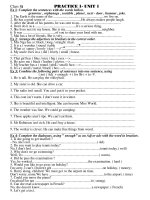
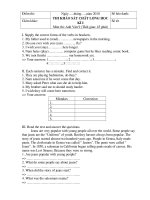

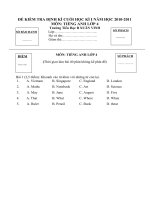
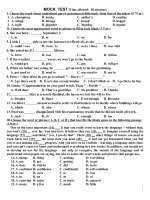
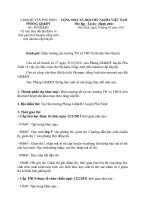

![Tài liệu [Luyện thi tiếng Anh] Test on English_01 docx](https://media.store123doc.com/images/document/13/ce/zx/medium_zxp1386933312.jpg)
![Tài liệu [Luyện thi tiếng Anh] Test on English_03 ppt](https://media.store123doc.com/images/document/13/ce/ow/medium_owb1386933313.jpg)
